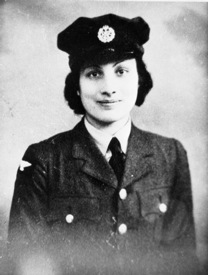 |
| Noor Inayat Khan. Source: wikipedia.org |
Many Indian women laid down their lives during the Second World War, to help save humanity from the horror of Nazism. Unfortunately, most of them remain unknown and unsung.
Indian women served in various capacities on several war fronts. Some worked as nurses in civil and military hospitals, some as members of the Women’s Auxiliary Corps (WAC) taking on critical assignments, some drove army vehicles, some operated switch boards while some worked as mechanics.
WAC members were trained to use weapons and were integrated with the regular army. They could choose to wear uniforms with skirts or even special saris. They were assigned various manual and technical jobs that had been the exclusive preserve of men.
The name of one of the women of Indian descent particularly stands out when speaking of contributions by Indian women to the war effort; that of Noor Inayat Khan. Her life was remarkable. She was a British secret agent of Indian origin who worked as the first female radio operator in Nazi-occupied France for the Special Operation Executive (SOE).
Noor was born on 1st January, 1914 in Moscow, to an Indian father and American mother. She was a direct descendant of Tipu Sultan, an 18th century ruler of Mysore state in south India, and a patriot who bitterly opposed British colonial rule.
Her father Inayat Khan was a famous musician and Sufi teacher. He shifted from Moscow first to Paris in 1920, and then to London in 1939, where Noor was educated and later, chose a career as a writer of stories for children. She escaped to Britain after the fall of France to Nazi Germany and joined the Women’s Auxiliary Air Force (WAAF) in November, 1940. She got in touch with underground Resistance groups in France and worked in collaboration with them.
Noor was recruited to join the SOE in 1942, as a radio operator. Although some of her trainers doubted her capabilities, she was flown to France to work as a radio operator for the “Prosper” resistance network in Paris, under the codename ‘Madeleine‘. Though many members of her team were arrested, she nevertheless chose to remain in France, constantly moving her location, while trying to send messages back to London.
She managed for a while to avoid capture, but was betrayed by a French woman, leading to her capture by the Gestapo in October 1943. Unfortunately, due to her inexperience, she had kept copies of all the signals she sent, thus helping the Germans to use her Radio to trick her contacts in London into sending new agents, straight into the hands of the Gestapo.
Noor managed to escape from prison but was recaptured a few hours later and transferred to in November 1943 to Pforzheim prison in Germany, where she was kept in chains, in solitary confinement and subjected to awful torture.
Despite continued torture over months, the Gestapo failed to procure any information from her about Allied intelligence contacts or the anti-fascist underground. She did not divulge any secret information to despite brutal Nazi attempts, so she was transferred to the infamous Dachau concentration camp, where she was executed by firing squad on 13th September, 1944.
Her incredible heroism was made known to the world in January 1946, well after the war ended, by General Charles de Gaulle, the President of France himself.
Just like the legendary Soviet partisan Zoya Kosmodemyanskaya, who refused to reveal any information to Nazi forces despite being subjected to horrific torture, and made a heroic speech just minutes before she was hanged, Noor too faced death with a smile on her face.
Noor was not only an anti-fascist fighter, she was a great champion of freedom for India. She had proclaimed that she would fight against British colonial authorities if India was not freed after the Nazis were defeated. When a British officer expressed doubts about her loyalty to Britain, Noor firmly replied, “I pledge to fight against Germany. But I shall fight against the British if India does not become independent after the defeat of fascism.”
While her work was not widely known during her lifetime, Noor was posthumously decorated with French and British awards in 1949.
As forces of neo-fascism again raise their heads in different parts of the world, the life of Noor Inayat Khan can serve as a source of inspiration to youth across the world.
The celebrations to commemorate the 70th anniversary of the great victory over Nazi Germany should also be an occasion to honour and popularize heroic individuals like Noor whose efforts and supreme sacrifice helped to defeat the forces of fascism.
All rights reserved by Rossiyskaya Gazeta.
Subscribe
to our newsletter!
Get the week's best stories straight to your inbox